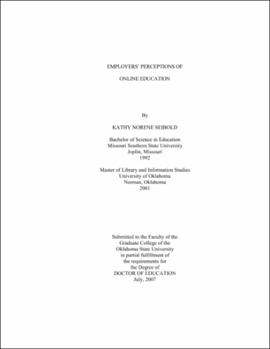| dc.contributor.advisor | Kearney, Kerri | |
| dc.contributor.author | Seibold, Kathy Norene | |
| dc.date.accessioned | 2013-11-26T08:34:52Z | |
| dc.date.available | 2013-11-26T08:34:52Z | |
| dc.date.issued | 2007-07 | |
| dc.identifier.uri | https://hdl.handle.net/11244/7564 | |
| dc.description.abstract | Scope and Method of Study: The purpose of this study was to explore employers' perceptions of online education and to identify the factors influencing the formation of these perceptions. The study employed a qualitative research approach. Purposeful random sampling was used to select 15 service-oriented companies in the Midwest that employed more than 500 employees. Of the 14 companies still in business at the time of the study, 6 companies agreed to interviews-43%. One supervisor or department head from each company was selected for interview, creating a total of 6 interviews. Field notes were taken at each interview location. The researcher collected artifacts detailing hiring practices via each company's human resources website. Content analysis was used to analyze the information collected and establish common themes. The extraction of themes from the interview transcripts included coding through the use of pawing and pile-sorting. Mere Exposure Theory was used as a lens when analyzing the themes that emerge from the information about exposure to online education. | |
| dc.description.abstract | Findings and Contributions: Analysis of the interviews, field notes, and artifacts produced 10 common themes: | |
| dc.description.abstract | Online education is convenient, but it lacks interactivity. | |
| dc.description.abstract | Online education increases student responsibility. | |
| dc.description.abstract | Participants prefer a hybrid or mixed media approach to education. | |
| dc.description.abstract | The future of online education is positive. | |
| dc.description.abstract | For-profit and non-profit educational institutions have different missions. | |
| dc.description.abstract | Online education impacts the hiring processes | |
| dc.description.abstract | Diploma classifications for Online Education are not needed. | |
| dc.description.abstract | Personal experience positively impacts perceptions. | |
| dc.description.abstract | Society has a negative impact on perceptions. | |
| dc.description.abstract | Public advertising is not capturing attention. | |
| dc.description.abstract | These themes established a connection to the research questions for the study. Mere Exposure was an appropriate lens to use for evaluating the perceptions of online education in the marketplace. The results seem to indicate that exposure is a key factor in the acceptance of online education for participants. | |
| dc.format | application/pdf | |
| dc.language | en_US | |
| dc.rights | Copyright is held by the author who has granted the Oklahoma State University Library the non-exclusive right to share this material in its institutional repository. Contact Digital Library Services at lib-dls@okstate.edu or 405-744-9161 for the permission policy on the use, reproduction or distribution of this material. | |
| dc.title | Employers' perceptions of online education | |
| dc.contributor.committeeMember | Stern, Kenneth | |
| dc.contributor.committeeMember | Hyle, Adrienne | |
| dc.contributor.committeeMember | DeBell, Camille | |
| osu.filename | Seibold_okstate_0664D_2378.pdf | |
| osu.accesstype | Open Access | |
| dc.type.genre | Dissertation | |
| dc.type.material | Text | |
| dc.subject.keywords | online education | |
| dc.subject.keywords | distance education | |
| dc.subject.keywords | employers' perceptions | |
| dc.subject.keywords | employment | |
| thesis.degree.discipline | Higher Education | |
| thesis.degree.grantor | Oklahoma State University | |
